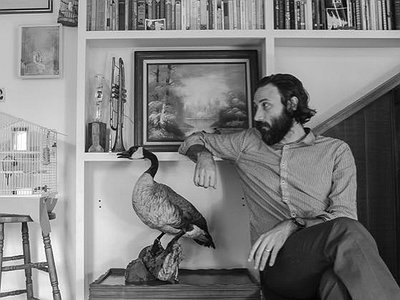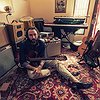Part 1
Name: Matt Costa
Nationality: American
Occupation: Composer
Current Release: Orange Sunshine Soundtrack
Musical Recommendations: Ry Cooder, George Auric
When did you start composing film music - and what or who were your early passions and influences?
I started making music for Skateboarding and Surf films. It's actually what made me hip to a bunch of music I would have never found out about if I hadn’t been exposed to the culture. I remember a John Barry piece was used in a skate film; the song never stood out to me in the original film but set behind skateboarding it moved me. I was 12 at the time. All through my teens I was editing other music into my own short videos and at 20 my own music was being used in other short films; I then started writing for them.
For most artists, originality is first preceded by a phase of learning and, often, emulating others. What was this like for you? How would you describe your own development as an artist and the transition towards your own voice?
For me that process never ends, but execution is where one's own style comes in. I have been working on my own records for about 14 years but it’s only recently that I’ve I done full scores.
What, to you, are the main functions and goals of soundtracks and film music and how would you rate their importance for the movie as a whole? Should film music remain connected to the picture it was conceived for or should have it an intrinsic value outside of the movies?
I think great art evokes something within us no matter the context. The film becomes part of the process. I don’t think a piece should necessarily stay connected to a film, but that just may be where it connects the best. A great score or soundtrack may draw more attention to a film.
Different composers could potentially approach the same scene with strikingly different music. Would you say there can be 'wrong' and 'right' musical decisions for some scenes? In which way can some film music be considered 'definitive'?
I like it when I hear minimalism. Take The Birds for example, it's incredible: some sparse synthetic noises that barely sound like birds, but makes the film strikingly haunting.
What were your main compositional challenges when starting out as a film composer and how have they changed over time?
I would say following some directors’ adjectives on how the music should sound, just as it’s hard to describe the colour green. But I start with a small sketch and say “something like that?”, and it gets the dialogue going further.
Tell us about your studio, please. What were criteria when setting it up and how does this environment influence the creative process? How important, relatively speaking, are factors like mood, ergonomics, haptics and technology for you?
I work from home and start most things solo. I orchestrate them so that they’re pretty complete before involving other musicians. I have old Life magazines taped to the walls and all my instruments within arm’s length. I like things to be quick and most of the time they have to be.
What are currently some of the most important tools and instruments you're using? In which way do certain production tools suggest certain approaches, in which way do they limit and/or expand your own creativity? How do you see the role of sound designers and software programmers in the creative process?
I have spent days on the phone troubleshooting and that's not fun. But tape machines need mechanics too. For getting an idea out, software tools are great but I think real instruments feel better and provide a good balance. I will work with real musicians via email and that has proved to be cool and efficient. I arrange my strings on Nord that I send to a cello/violin player in Portland, I have a Boss DR- 880 drum machine for drum ideas, and I play trumpet so I don’t need to worry about horn samples. I use a BAE 1073 Preamp, and for compression and vintage sound I will use UA 6176 (most likely chained so I can pull back some of the gain on the 6176 if I’m going wild!).
Many contemporary production tools already take over significant parts of what would formerly have constituted compositional work. How has this affected your own production process and its results? Are there any promising solutions or set-ups capable of triggering new ideas inside of you as a composer?
It is true that with the continued process of evolving technology the sound studio is at your fingertips. For example, a synthetic piece with a tape delay could take the place of strings. It leaves more room for experimentation in the same way Picasso or Cezanne worked a painting over piece by piece, and by blending colours that might seem initially counterintuitive, but ultimately adds depth and a new perspective.
Can you take me through your process of composing a soundtrack on the basis of a movie that's particularly dear to you, please? Where do ideas come from, what do you start with and how do you go about shaping these ideas?
Mostly I start with a piano, find a progression, and construct/deconstruct it. Then I play that to the film, slow down or accelerate tempo, and find changes that need to happen.
How do you see the relationship between image and sound in a movie? How directly are you working with the images in the writing process?
I am always working with image. I find that when composing pieces outside of film that are strictly sonic your mind’s eye needs to find the visual that informs the process. But when it comes to film it might be easy to say “ah, there's the image”, and just slap something on because the visual is done; there still needs to be a mental picture that is separate too. Having exercised this on my own recordings has helped.
What do improvisation and composition mean to you and what, to you, are their respective merits?
Improvisation is important to me but it’s not a jam session by any means, even when working with Rock instruments.
How do you see the relationship between sound, space and composition and what are some of your strategies and approaches of working with them?
I think of it like a giant sonic diorama.
Soundtrack composer typically need to adapt their ideas to the film, the director and the audience. How do you maintain a balance between, on the one hand, artistic integrity and sticking to your creative convictions and, on the other, being professional? How do you find a sense of freedom within these structures?
I enjoy the challenge of stepping outside my box but a film normally brings out things that would surface in my own work.
Over the decades, film music has developed a certain tradition and vocabulary of techniques and creative devices. How would you describe your relationship with this tradition and what roles does it play in your work? Are there compositional devices which you don't find appropriate or wouldn't use right now, because they're too closely associated with a particular era or because they feel like a cliché?
Sometimes a scene calls for cliché. I especially enjoy understanding clichés because that's how we arrived in the present. A well masked cliché is the key. And then sometimes you just need to get knocked right over the head.
The balance between visuals, fx and film music is a delicate one. What, from your point of view, determines whether or not it is a successful one?
When it moves me.





